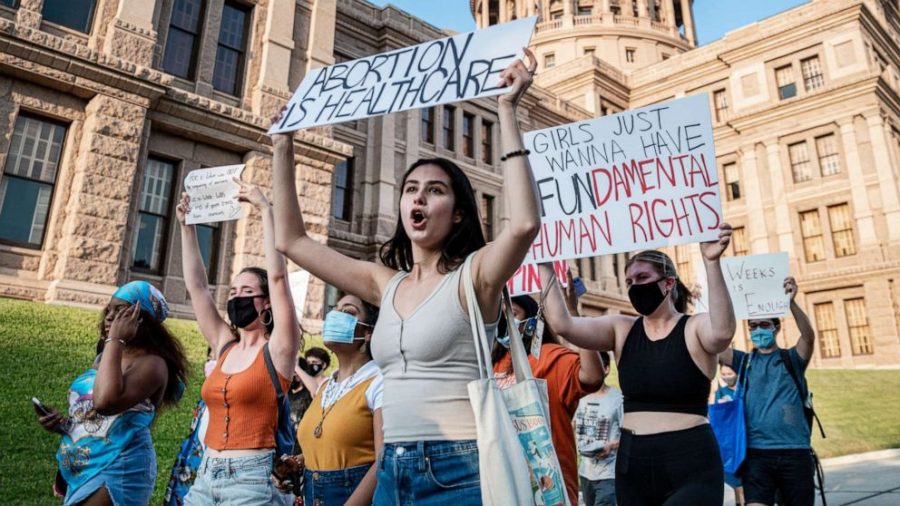Texas Abortion Ban
What is America’s most restrictive abortion ban?
*The opinions in this article only represent the views of the writer. If someone would like to write about the opposing viewpoint, please contact Ms. Hurt.
What is the Texas abortion ban?
The Senate 8 Bill, or Texas abortion ban, bans all abortions beyond six weeks into a women’s pregnancy. Furthermore, it allows private citizens to enforce the ban by giving them the ability to sue anyone they believe has violated the law or assisted someone in violating the law for up to $10,000. There are no exceptions for cases of incest or rape.
Why is this an issue?
From a legal standpoint, this ban is unconstitutional. In the 1973 Supreme Court Case, Roe v. Wade, the Supreme Court ruled that a woman’s access to abortion is a constitutional right. This decision is supported by the 1st, 4th, 5th, 9th, and 14th amendments, which protect a woman’s right to privacy and choice as to whether or not she wants an abortion. As such, a law that takes away a woman’s right to privacy and her right to choose violates this ruling and the constitutional amendments. Additionally, Roe v. Wade established that a state may only regulate abortion in the second trimester when reasons are related to maternal health or once the fetus reaches the third trimester, or point where a fetus is considered viable, but that states may not impose regulations within the first trimester of a pregnancy. Since the first trimester of a woman’s pregnancy is weeks 0 to 13 and Senate Bill 8 prohibits abortions past six weeks, the ban regulates abortion in the first trimester, which once again violates Roe v. Wade.

Another issue with banning abortion after week six is that a woman is often not aware she is pregnant by this point. A woman’s menstrual cycle is about four weeks, so six weeks into pregnancy is only two weeks late. For some women with irregular cycles, this is normal. Symptoms a woman may experience at this time are similar to those they experience during premenstrual syndrome or during menstruation, so pregnancy is often overlooked during this time.
One of the most disturbing parts of this new law is that there are no exceptions for cases of incest or rape. While it is true that the number of pregnancies resulting from incest and rape are relatively low, there are a variety of reasons a woman would choose to terminate this type of pregnancy. Some of the reasons women seek abortions are that they are not financially capable of having a child, are not mentally prepared to have a child, physically cannot carry or birth a child, or simply because they do not want a child. Other reasons that pertain to incest and rape are that abortions may be necessary when the pregnancy is dangerous to the mother, harmful to the baby, or the baby will not have a good quality of life (genetic disorders, the child would not live to term). Not only is incest illegal across the United States, often times children of incest are born with birth defects that can lead to poor quality of life. Why then, if it is both illegal and harmful to the fetus, should women carrying children resulting from incest be forced to carry the child to term? Rape and other forms of sexual violence are significant issues across the nation and are both mentally and physically scarring to the victim. So, why should a woman who is physically and mentally damaged by her situation be forced to carry a child that will only remind her of the assault?
Bigger Issue
Abortion is not only an argument about a woman’s right to choose, but about women’s rights as a whole. If it were simply an argument over the right to choose, why would it not be the same as the current argument over masks and vaccines? Why can those individuals (ironically the same individuals often pushing for abortion restrictions) refuse to wear a mask or get vaccinated because it is “their body, their choice,” yet a woman cannot make a decision about her own body?
Abortion is a woman’s right. It is not up to a man or a politician or anyone except the woman herself to make choices about her body and her life. How would a man feel, if there were to be a reversible vasectomy mandate? Vasectomies also prevent pregnancy so would they not be a good method to prevent abortion as well?
Implications
With this ban in place, what will happen to women in Texas, particularly those seeking abortions? First, there will be a rise in the number of unsafe abortions. Without access to safe abortions and (legal) help from medical professionals, women will turn to alternative methods of abortion. This increases the chances of death and injury resulting from complications as well as the maternal mortality rate in the state of Texas.
Second, this ban will increase the racial disparities in health care, particularly in maternal health. In the United States, black women are three times more likely than women of any other race to die in childbirth and are more likely to experience prenatal issues such as preeclampsia or hypertension. One of the main causes of this issue is the lack of access to health care among women of color; this ban makes it even more difficult for these women to find adequate care.
Women in need of maternal healthcare will be forced to look outside of the state for assistance, which takes a tremendous amount of time and money. There are some organizations in Texas that will help with travel, such as Fund Texas Choice, who provide travel assistance to abortion clinics in and out of state. Other organizations, such as The Lilith Fund, help cover the cost of the procedure.
Unfortunately, Texas is just one example of a state pushing for abortion restrictions. Other states, including our own, are slowly proposing anti-abortion bills and the Supreme Court is not helping shut them down. As a final farewell, President Trump appointed Amy Coney Barrett as an Associate Justice of the Supreme Court, making our Supreme Court more conservative than ever and more likely for bans to continue.
It is crucial that we continue to fight for our rights. To use our voices and speak out against acts such as the Texas abortion ban because abortion is a woman’s decision. Abortion is healthcare. Most of all, abortion is a woman’s right.
*The opinions in this article do not represent the opinions of the entire Talon staff. If someone would like to write about the opposing viewpoint, please contact Ms. Hurt








